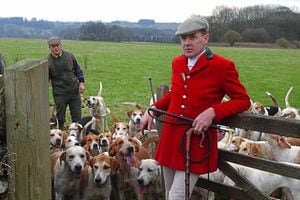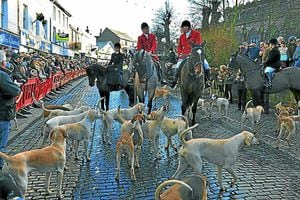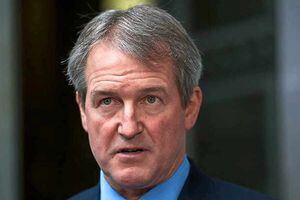Hunt row still rages after a decade
Bitter exchanges in Parliament, angry confrontations on the street. The first invasion of the House of Commons Chamber since the days of King Charles I.

There have been few Acts of Parliament which have provoked such bitter debate and raw emotion as the ban on hunting with hounds.
It is 10 years this week since the Hunting Act 2004 finally made its way onto the statute books, although it was another three months before the law actually came into effect.
And a decade on, the debate continues to rage, with feelings still running high on both sides.
Julian Barnfield, master of the North Shropshire Hunt which holds its Boxing Day Hunt at Wollerton, near Market Drayton, says the Act has achieved nothing.
"It was a badly written piece of legislation that has served no purpose, it hasn't saved the life of a single fox," he says.
"The hunts continue to be very strong, hunting legally.
"We know it has not saved any foxes, all it has led to is an increase in the number of foxes being snared and shot.
"Foxes have no natural predators, so they have to be controlled in some way or another."
And he says despite the legislation, the hunts continue to be as strong as ever, although he says it has made life more difficult.
"It has made a difference, there are people out there turning up with video cameras and taking photographs," he says.
"They are trying to get a prosecution against you when you are legally drag hunting.
"It is very difficult when you are trailing anything in the countryside not to get dragged off course."
Two years ago, Mr Barnfield became one of around 600 people who have been prosecuted under the Act since it came into force. He was fined £1,000 when he appeared before Oxford Magistrates, after admitting a breach of the Act during the 2011/12 season.
But the 51-year-old says the only reason he pleaded guilty was that he could not afford the cost of defending his case.
"The RSPCA took out a private prosecution, and spent £330,000 on their case," he says.
"We didn't have the funds to fight it, we had to cut a deal."

Despite the ban, around 3,000 people continue to turn out to the Albrighton Woodland Boxing Day Hunt at Newport, with another 1,000 attending its other meeting the same day at Hagley Hall, near Stourbridge.
But Albrighton Woodland joint secretary Julian Hill says while the hunt has continued to thrive, the law has been bad for animals.
"It's not good for foxes. You can still kill a fox, you can poison a fox, you can shoot or snare them," says Mr Hill, who became interested after getting his first horse in his 20s.
"We often find foxes in a bad way when we go out, they have been shot in the back legs and gone off and run somewhere."

At the time the law was passed, one of the most outspoken opponents of the ban was Otis Ferry, son of rock star Brian Ferry, and joint master of the South Shropshire Hunt.
Along with seven others, he stormed into the chamber of the House of Commons during the bill's third reading, in what was the first invasion of the chamber since 1641. It was reported that he dressed up as a builder to avoid being picked up by security.
A vocal supporter of the new legislation at the time was David Wright, the Labour MP for Telford, who repeatedly voted for the bill as it passed through parliament.
"I do think there are issues about enforcement, but I think the ban is important," he said.
"It should be enforced, and I don't think there are any grounds for repealing the ban, which is what the present Government seems to want to do."
Certainly, his parliamentary neighbour Mark Pritchard, Conservative MP for The Wrekin, would very much like to see the ban lifted. "I'm pro fox hunting on animal welfare grounds," he says.
"The alternatives to keeping fox numbers down are shooting, trapping or poisoning, some of which are illegal, and can also do harm to other wildlife and can cause foxes to die in agony over many days rather be killed in seconds by hounds.
"The way the last Labour Government treated the countryside was appalling."

Owen Paterson, the Shropshire North MP and former Secretary of State for the Environment, Food and Rural Affairs, is also a strong opponent of the law.
"It was passed by MPs who didn't understand the countryside, I sat on the committees when the legislation was drawn up, and there was a lot of ignorance about," he says.
Unsurprisingly, chief executive for the League Against Cruel Sports, Joe Duckworth, is a firm supporter of the ban.
He says the Hunting Act has been an effective and popular piece of legislation, with a higher number of convictions than similar wildlife laws.
"Public support for the prohibition of hunting has always been high, but this has also increased substantially over the past 10 years.
"The problem is not with the law. It's with those that flout it. It is time to now build on the successes of first 10 years and strengthen the Hunting Act to ensure the spirit of the Act is fulfilled."
But even he has some reservations.
The League is calling for the tightening of the law by adding a provision of 'reckless' hunting, which it says would prevent the killing of animals during a trail hunt being passed off as accidental.
The League also wants stiffer penalties for those breaking the law, as well as a ban on using dogs underground.
"This is arguably where the worst cruelty occurs," says Mr Duckworth.
"Not only to wild mammals pursued underground with limited opportunity to escape, but also to the dogs sent below ground to find these animals and either flush them out or hold them at bay."
However, to Mr Barnfield, the legislation has little to do with animal welfare, but is about urban MPs who simply do not understand the ways and traditions of the countryside.
"I think it is completely about class war, which is a complete nonsense because we have got a window cleaner who hunts" he says.
"Anyone can go hunting, it's not that expensive compared with shooting. The people who work in hunting are just ordinary working-class people."
And 10 years on, he still holds out hope that the Act will be repealed.
With the outcome of the next General Election looking distinctly uncertain, and another hung parliament a very real possibility, one would have to say that the odds of such legislation being given priority look rather slim.
But Mr Barnfield is not going to give up."David Cameron said he would repeal the law," he says.
"You would hope he is a man of his word."





